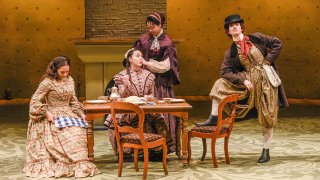
Maggie Thompson, Lilli Hokama, Jennie Greenberry and Pearl Rhein played the March sisters in Dallas Theater Center’s Little Women in February.
Meg, Jo, Beth and Amy – they are America’s favorite sisters, beloved from the moment they appeared on the pages of Louisa May Alcott’s novel Little Women. In Kate Hamill’s stage adaptation of the classic, now being produced by the Dallas Theater Center at the Kalita Humphreys Theater through March 1, the sisters’ coming-of-age story is as modern as it was when it was published in the late nineteenth century.
The familiar story of four sisters growing up during the Civil War remains, but this feminist adaptation explores the societal expectations of women during Alcott’s lifetime and the relevance of those expectations today.
“Even back then, it was really going against the gender norms of the day in terms of what a woman should want or what was possible for a woman to achieve and in 2020, we’re still dealing with that,” Jennie Greenberry, who plays Meg, said. “The character of Jo, in particular, shows there’s more than one way to be a woman in this world.”
The play gives women a strong voice to tell their own stories. “I think in the theatrical canon, there’s a lot of space and time for men and boys to explore themselves loudly and in public. There’s no room for that for women. I think that’s part of the contemporary appeal,” Maggie Thompson, who plays Beth, said.
Pearl Rhein plays Jo, the most spirited sister who is not sure she likes being a girl. She is not comfortable wearing dresses and sitting like a lady does not come naturally to her.
“I think this text really highlights her struggle with gender presentation,” Rhein said. “Kate absolutely laid the groundwork for that. She has Jo really struggling and talking about how she can’t be a lady by these standards.”
The Scene
As a proud queer actor, Rhein has always identified with Jo and she recognizes her casting allows audiences to see this classic heroine on the spectrum of gender fluidity. “I had friends who when I announced I got this job said, ‘Finally, a queer Jo! Yes!’ That brings me so much joy,” Rhein said.
In contrast, Meg is the caretaker of the family, dreaming of her own marriage. “I love that we see such a juxtaposition between her character and Jo’s character. In Louisa May Alcott’s world and in Kate Hamill’s adaptation, it’s not an ‘either/or’ situation. They are not being pit against each other,” Greenberry said. “I like that it’s a ‘yes and’ situation. It’s okay to want a spouse and a family and your own corner of the world.”
Beth is the family’s quiet conscience. “I think the great blessing and also incredible challenge of the part is she is such a pure force of good, of love and of selflessness,” Thompson said. “I think everybody has a little bit of Beth in them and I think if we could all find a way to amplify that Beth voice, the world would be a better place.”
Lilli Hokama plays Amy, the youngest of the sisters who grows the most throughout the show. “She becomes a lot smarter and a lot more worldly savvy. As Lilli, it’s a little heartbreaking to reconcile the fact that she sees the world for what it is and for how it will see Jo and she tries to be a gentler voice of reason,” Hokama said.
This cast looks different from traditional productions of Little Women. Hamill intends the cast to be ethnically diverse, reflecting modern American society. “It forces us to reconcile with the fact that this country has always looked this way,” Thompson said. “It’s sort of the great American myth that only white people are in art, that only white people are at the center of these stories.”
All four actors see themselves in the March sisters, identifying with different sisters at different stages of their lives. “As a kid, I think I was a bit of an Amy because I am a little sister and I felt persecuted,” Greenberry said. “As a young woman, I relate to Meg’s struggle in wondering when this whole family train gets started and it is okay to want those things.”
Thompson was the shy girl who grew up to find her place in the theater and now enjoys being center stage. “I feel like my existence is a tug of war between my Beth side of my brain and my Jo side of my brain,” Thompson said.
With a little self-reflection, Hokama surprised herself. “When I was little, I thought I was a Jo, but now that I’m a little bit older and have a little bit more perspective, I’m having to come to terms that I was a lot like Amy growing up,” Hokama said. “And I have an appreciation for the nicer things in life. I think Amy is just so drawn to beauty and that’s why she loves painting and art. She wants to make things nice. And I go home and clean and tidy because I like when things look nice. I understand that feeling of not coming from a lot and of wanting something more, something lovely.”
“I’m such a Jo,” Rhein said, recalling Jo’s love of writing plays for her siblings to perform and her bossiness. “That’s what I did. As a kid, I wrote Rumpelstiltskin and I made everyone be in it and I played Rumpelstiltskin and Rumpelstiltskin would get all of the best jokes.”
More than 150 years later, Alcott continues to encourage women to create the life they want. “She paints just a really cool picture for a young kid that says you don’t have to grow up and live life like we’ve been saying you should,” Hokama said.
MORE: DallasTheaterCenter.org
Click here to read The Dallas Morning News review of the show